[misunderstanding] does drinking coffee often lead to calcium deficiency? Will drinking coffee lead to osteoporosis? What are the disadvantages of drinking coffee?
Professional coffee knowledge exchange more coffee bean information please follow the coffee workshop (Wechat official account cafe_style)
China's coffee market is booming, one or two cups of coffee a day has become a common occurrence for many people, but many people still have many health concerns about coffee, such as whether drinking coffee regularly will lead to addiction. Can coffee cause palpitations? And what the editor wants to crack today-the misunderstanding that drinking coffee will lead to calcium deficiency!

Does oxalic acid in coffee inhibit calcium absorption?
The most common reason that coffee inhibits calcium absorption is that coffee contains oxalic acid, which combines with calcium and reduces calcium absorption. Some people even suggest that coffee should be taken separately from high-calcium foods such as milk, such as latte, to avoid reducing the absorption rate of calcium after being bonded. Next, let's take a look at what oxalic acid is.
Oxalic acid (oxalic acid), also known as oxalic acid, is structurally linked to two carboxyl groups, so oxalic acid has two negative charges and happens to combine with two positively charged calcium ions (Ca2+) to further reduce calcium absorption.
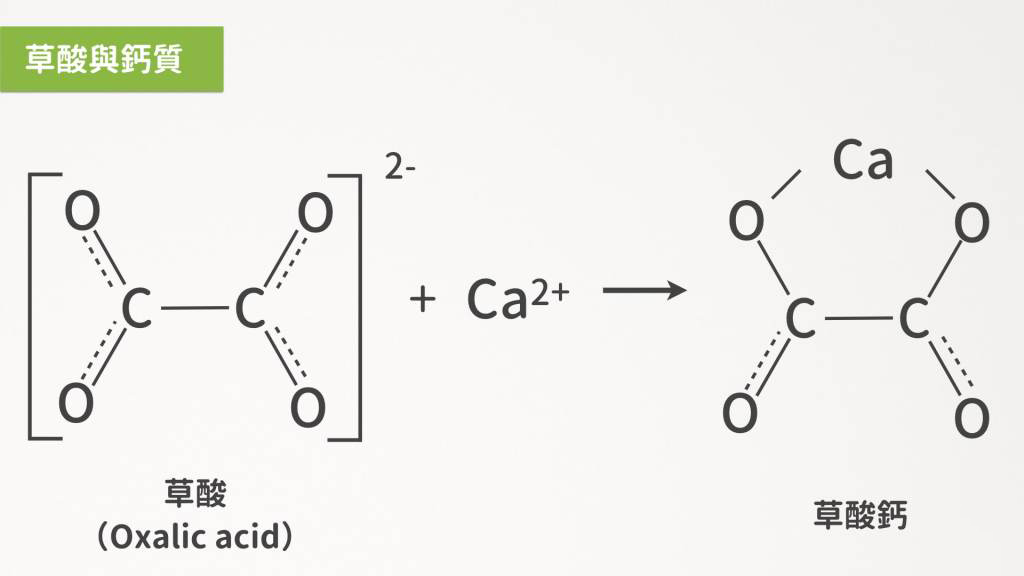
In previous studies, scholars used isotopes to calibrate calcium, allowing experimental animals to ingest calcium oxalate or spinach with high oxalic acid (containing high oxalate and calcium). Compared with the control group of calcium chloride (CaCl2), the calcium absorption rate was significantly reduced by 90%, proving that oxalic acid can inhibit calcium absorption!
But is coffee high in oxalic acid?
Oxalic acid and calcium are both bivalent ions, which theoretically combine at 1:1, so if you want to greatly inhibit calcium absorption, you must contain a lot of oxalic acid. Coffee beans are high in oxalic acid, with 200 milligrams of oxalic acid per 100 grams of raw coffee beans (dry weight).
But also consider roasting, brewing, usage and other factors that will affect the content of oxalic acid in coffee liquid. In fact, coffee "liquid" itself is not a food rich in oxalic acid. The content of oxalic acid per 100 grams of coffee liquid is only 0.9 mg (link). If you convert a large cup of coffee to only 2 mg, how can you combine a large amount of calcium in milk?
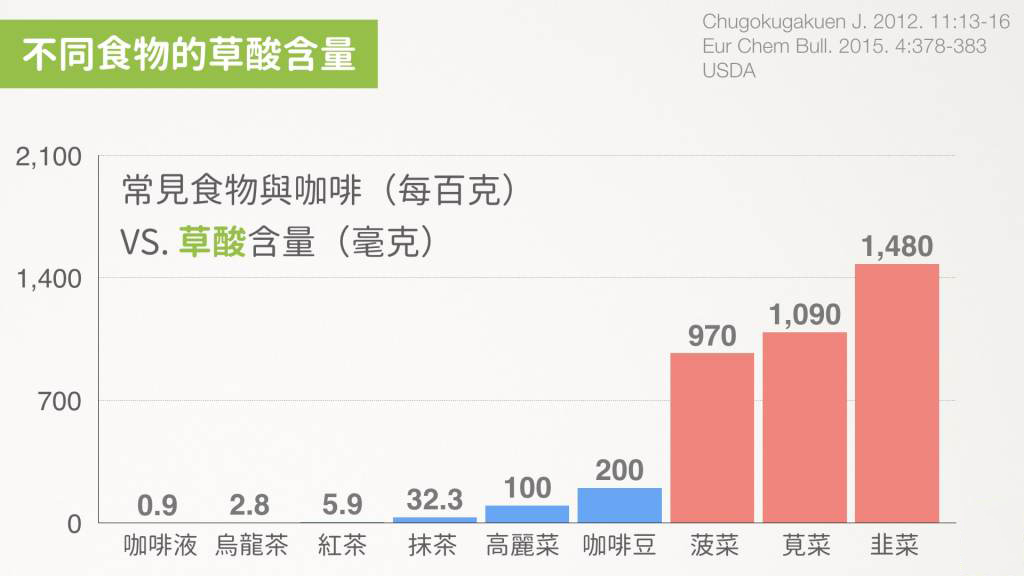
Caffeine in coffee inhibits calcium absorption?
In addition to oxalic acid, caffeine may also affect calcium absorption? But caffeine does not carry any charge, so how does it affect calcium absorption? To understand this problem, we must first understand how calcium is absorbed. The human body has two mechanisms of calcium absorption:
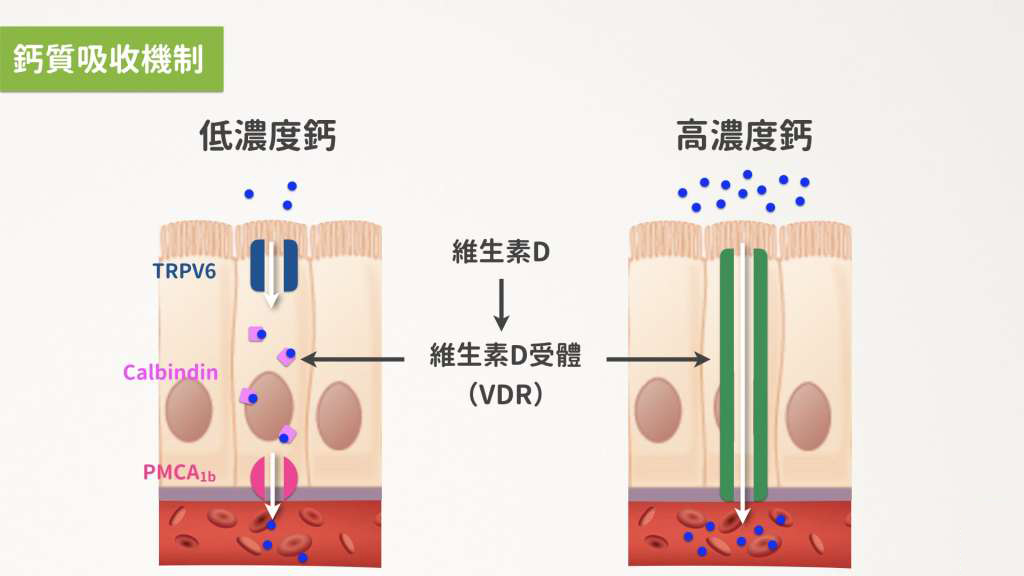
Dietary calcium content is low, intestinal calcium concentration is low:
At this time, calcium is absorbed through two channels on both sides of intestinal cells. Calcium first enters the intestinal parietal cells from the intestinal cavity. There is a protein called calcium binding protein (calbidin) in the cells, which binds calcium and helps calcium to be absorbed into the body through the channel proteins on the other side. Calbidin is regulated by vitamin D, which is regulated by vitamin D binding to vitamin D receptors in cells (VDR). Further promote the generation of calbidin.
High dietary calcium content and high intestinal calcium concentration:
Directly through the calcium channel protein, passively transported to the body through intestinal cells, this channel protein may also be regulated by vitamin D.
It can be seen that these two absorption mechanisms may be related to vitamin D. previous studies have reported that caffeine inhibits the expression of vitamin D receptors (VDR), but it has not been found that vitamin D receptors (VDR) in the intestines are also affected by caffeine, so there is no way to prove that caffeine reduces intestinal calcium absorption through this mechanism.
However, some scholars believe that as long as 1-2 spoonfuls of milk a day, the decline in calcium absorption caused by caffeine can be ignored!
Can coffee cause bone calcium loss? The point is whether you are getting enough calcium.
Although the oxalic acid and caffeine in coffee are not enough to affect calcium absorption, studies have found that caffeine does affect bone VDR protein expression and bone calcium deposition, and caffeine also promotes the activity (connection) of osteophagocytes, allowing osteophagocytes to release bone calcium into blood calcium.
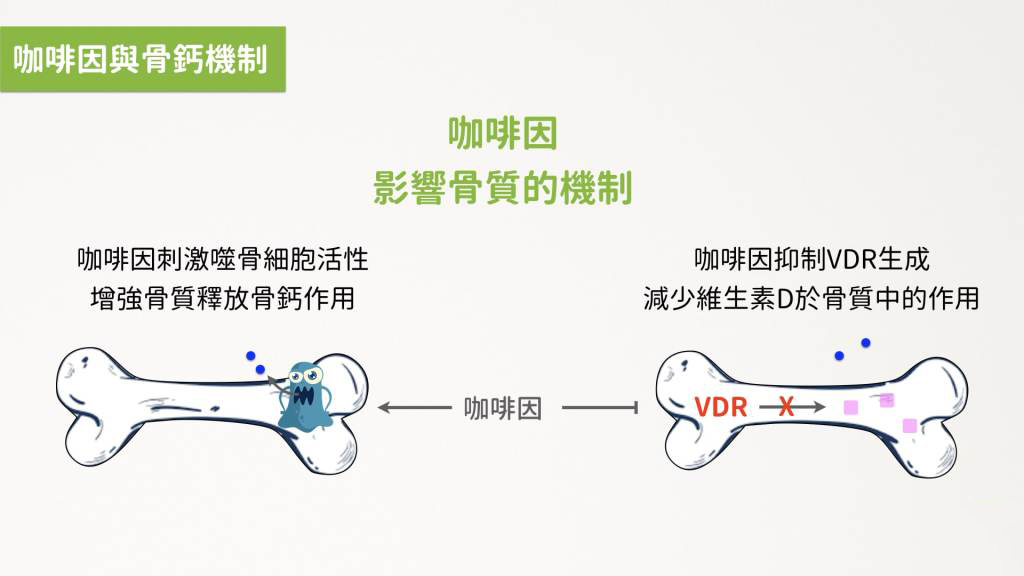
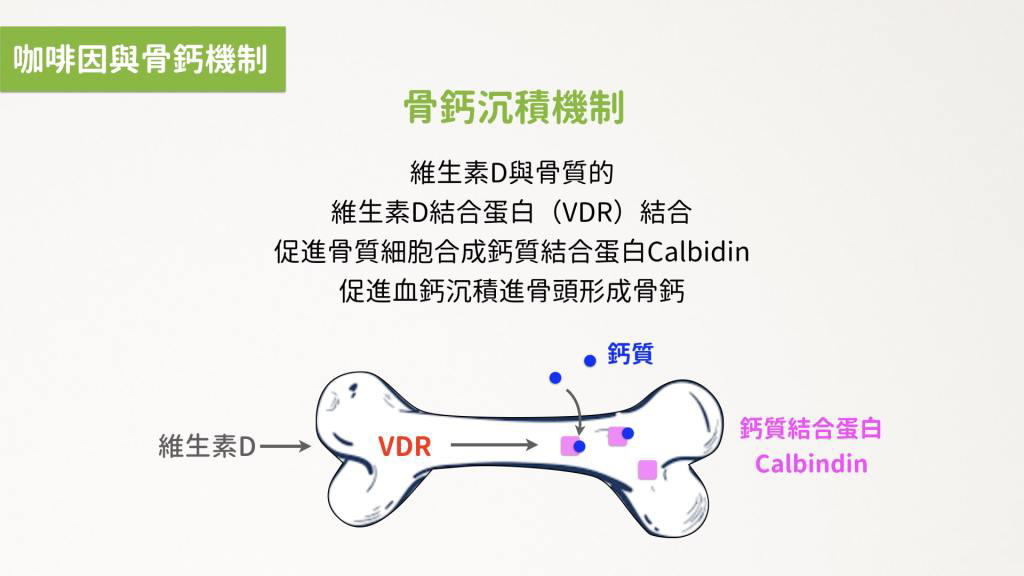
Many studies have found that drinking more coffee increases the risk of bone health. In the 2006 study, for example, people who drank 2-3 cups of coffee a day had a 39% increase in the risk of osteoporosis. and scholars adjusted for many factors and found that the increase in risk is related to caffeine intake, which means that there is a problem with drinking coffee?
But does drinking coffee really cause bone problems?
In fact, it has been mentioned in many studies that eating enough calcium or dairy products can offset the bone risk caused by coffee! In the above-mentioned 2006 study, scholars further analyzed the subjects' calcium intake and found that for people with sufficient calcium intake, coffee intake did not increase bone risk, and as early as 1994 in the Journal of the American Medical Association, it is mentioned that drinking enough milk can get enough calcium to offset the bone problems caused by coffee.
So the point is whether you are getting enough calcium or dairy products, not the coffee itself! As mentioned earlier, the oxalic acid and caffeine in coffee will not affect calcium absorption, so drinking latte coffee will be a good choice for those who are worried about their lack of calcium. Besides the flavor and nutrition of coffee, they can also supplement calcium to avoid the risk of bone.
Important Notice :
前街咖啡 FrontStreet Coffee has moved to new addredd:
FrontStreet Coffee Address: 315,Donghua East Road,GuangZhou
Tel:020 38364473
- Prev

What are the advantages or disadvantages of coffee for us? Which brand of instant coffee tastes good?
Professional coffee knowledge exchange more information about coffee beans Please pay attention to the pros and cons of drinking coffee in the coffee workshop (Wechat official account cafe_style) people often talk enthusiastically about coffee, some people like it very much, while others remain skeptical about coffee. Is the effect of coffee good or bad? We will sort out the reliable information as follows for your reference and self-judgment. Coffee
- Next

The visually impaired set up a coffee shop
Professional coffee knowledge exchange more coffee bean information please pay attention to the coffee workshop (Wechat official account cafe_style) Costa Rica's "black soul" coffee beans taste, like a "three good students", there is no deficiency; Africa's Yejia snow coffee is like a little boy running in the field, the taste is very bitter. "Wei Lin weighed the coffee beans while using the cup.
Related
- How did the Salvadoran coffee industry develop in Central America?
- What exactly does the golden cup extraction of coffee mean?
- The Origin of Coffee flower
- [2023 Starbucks World Earth Day] there are more meaningful things besides free Starbucks coffee!
- What kind of coffee is there in Spain? 9 Flavors of Spanish Coffee
- Aromatic African coffee| Kenya's coffee culture and historical production area
- Liberica Coffee Bean knowledge: the characteristics of Liberian Coffee beans of the three original species of Coffee beans
- The origin and formula of Spanish latte introduces the taste characteristics of Bombon coffee in Valencia, Spain.
- How to adjust the solution of over-extracted coffee
- What is the tasting period of coffee beans? What is the period of coffee and beans? How should coffee wake up and raise beans?

